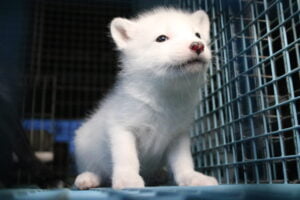
Fox cub born to die in a fur farm cage.
Californians can now officially celebrate the end of fur sales in the Golden State. A statewide ban on the sale of new animal fur products went into effect on Jan. 1, 2023, making California the first state in the U.S. to implement such a ban. Its citizens have waited more than three years for the new law to take effect after legislators passed AB 44, sponsored by Assemblymember Laura Friedman. The law, which makes it illegal to manufacture or sell a new animal fur product in California both through brick-and-mortar and online sales, included a phase-in period, giving retailers time to adjust and shift their inventory to fur-free products. It also allows for the continued sale of used animal fur products sold at nonprofit thrift stores, secondhand stores and pawn shops.
California’s ban on the sale of fur products is expected to make a massive dent in the fur industry. Federal fur sales data shows that nearly 25% of all fur product sales in the U.S. occur in California. The new law helps end the suffering of millions of animals either born to die on fur farms or caught in cruel traps in the wild, just so their coats can be used to create luxury goods like hats and loafers.
Each year, more than 100 million animals, such as mink, foxes, raccoon dogs and chinchillas, are raised and killed on fur farms. While most fur sold in the U.S. comes from operations in other countries, primarily China and Europe, fur farms do still exist in some U.S. states. For instance, Wisconsin, Utah, Idaho, Washington and Oregon still allow the farming of animals for their fur. Much of this fur is sent overseas to be made into garments.
Animals kept at these facilities live in some of the cruelest conditions imaginable. These wild animals are typically held captive in small wire cages and are unable to fulfill natural behaviors like swimming, digging and running. They remain largely unprotected by laws in the U.S. and overseas, such as mandatory inspections and humane slaughter laws, and they are often electrocuted, gassed or bludgeoned to death so that their pelts are not damaged. In some instances, animals may not die from these methods and are skinned while still alive.
As unbearable as it is to think of this kind of intense and pointless suffering, we’re witnessing real progress toward relegating this brutality to the history books. Communities are taking it upon themselves to help put an end to the unconscionable cruelty that is inherent to the fur industry. Grassroots advocates in the U.S. and across the globe are stepping up to pass policies that end the sale of fur products. Before the passage of California’s ban on the sale of fur products, four municipalities (Los Angeles, San Francisco, Berkeley and West Hollywood) passed local ordinances banning these products, paving the way for statewide legislation. Many other communities from coast to coast have followed suit, and global leaders are taking notice.
Internationally, more than 20 countries have passed laws to limit or outright ban fur farming and, in 2021, Israel became the first country to prohibit the sale of fur products. Now, European citizens are gathering signatures in support of a “Fur-Free Europe” European Citizens’ Initiative asking for a ban on fur farming and placing fur-farmed products on the European marketplace. Although the petition has already gathered the necessary 1 million signatures needed by May 2023 for the European Commission to issue a formal response, it remains open to collect additional signatures. I encourage citizens of the European Union to sign it.
Also, at the corporate level, companies continue to drop animal fur from their product lines, with several policies going into effect to align with California’s fur ban. Canada Goose, Kering, Saks Fifth Avenue, Zegna Group, Rudsak, Mytheresa and Moose Knuckles all pledged to go fur-free by the end of 2022, and Neiman Marcus by March 2023. While only a few companies still sell animal fur, one of the last major holdouts is the corporate conglomerate LVMH (parent company for brands such as Louis Vuitton, Dior, Marc Jacobs, Loro Piana and Fendi). That this conglomerate still sells fur has made it the target of persistent global outreach from animal welfare advocates calling on the corporation to ban fur sales once and for all.
We should absolutely celebrate California banning fur sales and other recent wins in our fight against fur, but there is still much work to be done, and you can help. If you are interested on working toward a fur sales bans in your area, check out our ordinance toolkit, which provides an easy guide for taking action in your own community. You can also find plenty of additional information and resources on our Going Fur-Free webpage.
Read this article on the Humane Society of the United States blog
